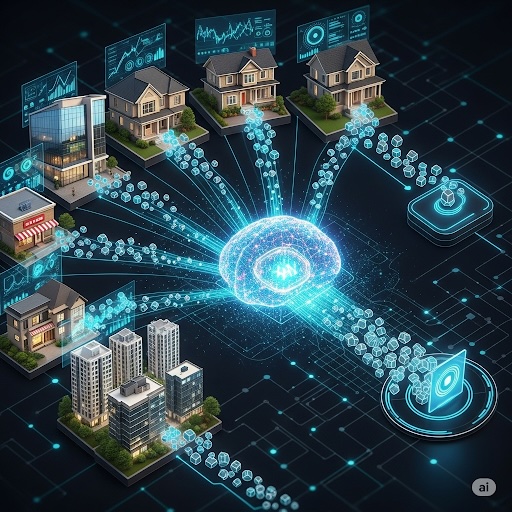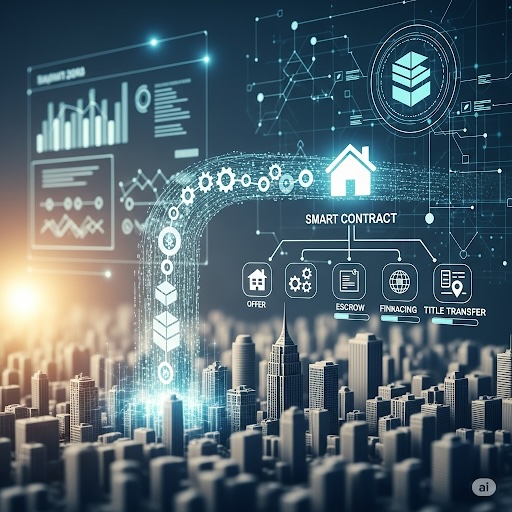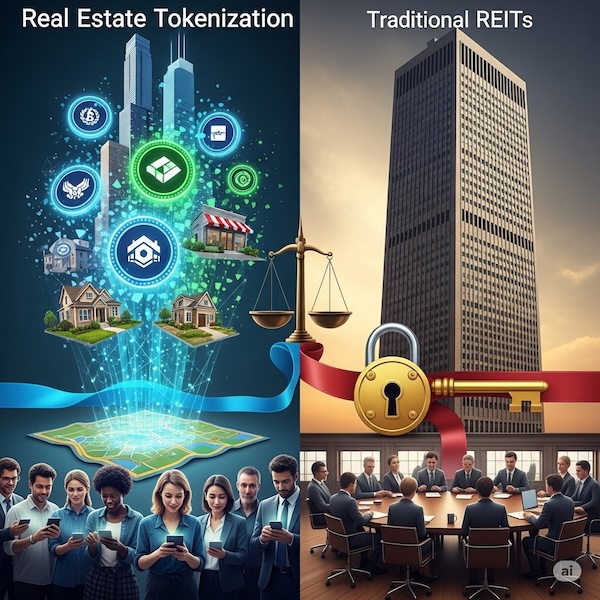Artificial Intelligence is fundamentally transforming the real estate industry, and nowhere is this more evident than in property valuation and tokenization. As we move toward a more digital and data-driven approach to real estate investment, AI technologies are providing unprecedented accuracy, efficiency, and insights that were previously impossible to achieve through traditional methods.
The convergence of AI and blockchain technology is creating new possibilities for how we analyze, value, and invest in real estate. From automated valuation models that can process millions of data points in seconds to machine learning algorithms that can predict market trends with remarkable accuracy, AI is becoming an indispensable tool in the modern real estate investor's toolkit.
The Evolution of Property Valuation
Traditional property valuation has long relied on human expertise, comparable sales analysis, and subjective assessments. While these methods have served the industry for decades, they come with inherent limitations that become more apparent as markets become more complex and data-driven:
- Time-Intensive Processes: Manual appraisals can take weeks or months to complete, during which market conditions may change significantly
- Human Bias: Subjective judgments can introduce inconsistencies and errors, particularly when appraisers have limited experience with specific property types or markets
- Limited Data Analysis: Human capacity to process vast amounts of market data is constrained, leading to potentially missed insights or trends
- Geographic Limitations: Appraisers typically specialize in specific local markets, making it difficult to provide consistent valuations across different regions
- Scalability Challenges: Traditional methods don't scale efficiently for large portfolios or rapid market analysis
- Static Analysis: Traditional valuations provide a point-in-time assessment that quickly becomes outdated in dynamic markets
AI-powered valuation systems address these limitations by leveraging machine learning algorithms, big data analytics, and automated processing capabilities to deliver faster, more accurate, and more consistent property valuations. These systems can continuously update their assessments as new data becomes available, providing real-time insights that traditional methods simply cannot match.
AI-Powered Automated Valuation Models (AVMs)
Advanced Data Processing
Modern AI systems can process and analyze vast amounts of data that would be impossible for human appraisers to handle manually. These systems integrate multiple data sources to create comprehensive property profiles:
- Market Data Integration: Real-time analysis of comparable sales, rental rates, market trends, and economic indicators across multiple markets and time periods
- Property Characteristics: Detailed analysis of square footage, lot size, age, condition, amenities, architectural style, and construction quality
- Location Intelligence: Proximity analysis to schools, transportation hubs, shopping centers, employment centers, and other value-driving amenities
- Economic Indicators: Local employment rates, population growth, income levels, economic development projects, and demographic trends
- Environmental Factors: Climate risks, natural disaster exposure, environmental regulations, and sustainability features
- Regulatory Environment: Zoning laws, building codes, tax policies, and development restrictions that may impact property values
Machine Learning Algorithms
AI valuation systems employ sophisticated machine learning techniques that continuously improve their accuracy through exposure to new data:
- Neural Networks: Deep learning models that can identify complex, non-linear patterns in property data and market behavior
- Random Forest Models: Ensemble methods that combine multiple decision trees to improve prediction accuracy and reduce overfitting
- Gradient Boosting: Algorithms that iteratively improve predictions by learning from previous errors and adjusting model parameters
- Natural Language Processing: Analysis of property descriptions, reviews, market commentary, and news articles to extract sentiment and qualitative insights
- Computer Vision: Image analysis of property photos, satellite imagery, and street view data to assess condition, features, and neighborhood characteristics
- Time Series Analysis: Algorithms that can identify seasonal patterns, market cycles, and long-term trends in property values
Real-Time Market Analysis
Dynamic Pricing Models
AI enables real-time property valuation that adapts to changing market conditions, providing investors with up-to-date insights for decision-making:
- Continuous Data Updates: Real-time integration of new sales data, market trends, economic indicators, and regulatory changes
- Seasonal Adjustments: Automatic adjustment for seasonal market variations, holiday effects, and cyclical patterns
- Market Cycle Recognition: Identification of market peaks, troughs, and transition periods to inform timing decisions
- Micro-Market Analysis: Granular analysis of neighborhood-level market dynamics, including gentrification trends and development impacts
- Cross-Market Correlation: Understanding how events in one market may impact property values in related markets
Predictive Analytics
AI systems can forecast future property values and market trends with increasing accuracy, enabling more informed investment decisions:
- Price Appreciation Forecasting: Predictions of future property value changes based on historical patterns, market fundamentals, and economic projections
- Market Timing Analysis: Optimal timing recommendations for property acquisitions, dispositions, and refinancing decisions
- Risk Assessment: Identification of properties with higher volatility, downside risk, or potential for value decline
- Investment Opportunity Scoring: Ranking properties based on investment potential, risk-adjusted returns, and alignment with investor objectives
- Scenario Modeling: Analysis of how different economic scenarios might impact property values and investment returns
AI in Tokenization Due Diligence
Automated Property Analysis
AI streamlines the due diligence process for tokenized real estate offerings, reducing time and costs while improving accuracy:
- Document Processing: Automated analysis of legal documents, leases, financial statements, and property records using natural language processing
- Compliance Verification: Checking properties against regulatory requirements, zoning restrictions, and environmental regulations
- Risk Identification: Automated detection of potential issues, red flags, or inconsistencies in property documentation
- Market Positioning: Analysis of how properties compare to similar assets in terms of pricing, features, and investment potential
- Title and Lien Analysis: Automated review of title documents and identification of potential encumbrances or legal issues
Financial Modeling and Projections
AI enhances financial analysis for tokenized properties by creating more sophisticated and accurate financial models:
- Cash Flow Modeling: Sophisticated projections of rental income, expenses, and net operating income based on market data and property characteristics
- Scenario Analysis: Multiple financial scenarios based on different market conditions, occupancy rates, and economic environments
- Sensitivity Analysis: Understanding how changes in key variables (interest rates, occupancy, rents) affect investment returns
- Optimization Algorithms: Identifying optimal capital allocation, improvement strategies, and operational decisions to maximize returns
- Risk-Adjusted Returns: Calculating risk-adjusted performance metrics that account for volatility and downside risk
Computer Vision and Property Assessment
Image Analysis Technology
AI-powered computer vision is revolutionizing how properties are assessed and valued, providing objective analysis of visual data:
- Condition Assessment: Automated analysis of property condition from photos, identifying maintenance needs and quality issues
- Feature Recognition: Identification of property amenities, finishes, upgrades, and architectural features that impact value
- Damage Detection: Spotting maintenance issues, structural problems, or damage that may not be immediately apparent
- Comparative Analysis: Comparing properties based on visual characteristics, finishes, and overall presentation
- Virtual Staging: AI-powered virtual staging and renovation visualization to assess improvement potential
Satellite and Aerial Imagery
AI analysis of satellite and drone imagery provides additional insights that ground-level inspection cannot capture:
- Property Boundaries: Accurate measurement of lot sizes, boundaries, and easements using high-resolution imagery
- Neighborhood Analysis: Assessment of surrounding area characteristics, development patterns, and amenity access
- Development Tracking: Monitoring of new construction, infrastructure improvements, and area development over time
- Environmental Assessment: Identification of environmental risks, flood zones, and natural features that impact property values
- Traffic and Accessibility: Analysis of traffic patterns, parking availability, and transportation access
Conclusion
Artificial Intelligence is fundamentally transforming property valuation and tokenization, offering unprecedented accuracy, efficiency, and insights that are reshaping how we think about real estate investment. From automated valuation models that can process vast amounts of data in real-time to computer vision systems that can assess property conditions from images, AI is making real estate analysis more sophisticated, objective, and accessible than ever before.
At RealPort, we're at the forefront of integrating AI technologies into our tokenization platform. Our AI-powered valuation systems provide investors with more accurate, timely, and comprehensive property analysis, while our machine learning algorithms continuously improve our risk assessment and investment matching capabilities.
The role of artificial intelligence in property valuation and tokenization is not just about replacing human judgment—it's about augmenting human capabilities and creating new possibilities for real estate investment. By embracing these technologies responsibly and thoughtfully, we can build a more efficient, transparent, and accessible real estate market for everyone.


